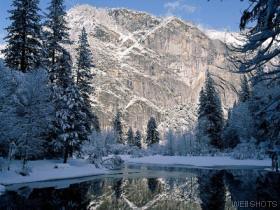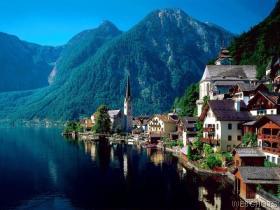
Who is authorized by the Creator to live in the land of Palestine? This is what we will answer based on the authority of the Word of God as given to us in the sacred Scriptures.
It has
been the situation for centuries that only a minority of the world's population
desire to know the truth about the occupancy of this land. In general, man
is not interested in hearing what God requires of him, for he does not want
to obey Him.
Man is self-centered. His interests are centered in himself, his family, and a circle of friends. He wants to be his own god, to be able to decide for himself what is best. He rules God out of his activities, because He does not want to submit himself to God's rulership. He does not want to hear that man is answerable to Him, and, therefore, what He requires of man. The offshoot of this is that the differing societies have their own frame of reference for judging what is best for man; and when the views are irreconcilable, conflict, strife, and war is often the end product. What the Creator has said is being increasingly disregarded in favor of humanism-the belief that man is able to determine what is best for society and how he should live.
Whose god is God? This is absolutely certain: The God of Abraham, Isaac, and of Jacob; of Isaiah, Jeremiah, Ezekiel and of Daniel; of James, Peter, John the beloved, and of the apostle Paul is the sovereign God of the universe. The people of Europe, and the Middle East, of Africa and North America, of Islam and of Communism, are very soon going to find out in dramatic fashion: "Thus will I magnify Myself, and sanctify Myself; and I will be known in the eyes of many nations, and they shall know that I am the Lord (Hebrew-Jehovah)." The Lord is about to make His name known to many nations. He will magnify His name and it will not be blasphemed by these nations any more. God is One God. He has a Son and His name is Jesus. He is the Lord, and His purposes are not to be opposed on the earth: for He will have His enemies (the nations who have opposed Him) in derision. (Psalm 2:4; 59:8)
The right of occupation of the land of Palestine is a very important matter to all nations, and the consequences to individuals and nations for opposing God's will in the use of that land are most serious.
There is a presumption that is about that, if man is to survive on this planet, the community of man must work together to solve the serious problems of society, and that tolerance and a willingness to yield to the opinions and values of others is a necessary ingredient to the survival of communities and nations. Being willing to be tolerant of others' values, because they may be just as valid as one's own values, is held as a prerequisite to living peaceably among others, whether near neighbors or distant members of the community of man. Therefore, at times, compromise of values is necessary.
Tolerance
is taught as a means of bringing about peace among individuals and nations.
Those who promote this line of reasoning equate tolerance with permissiveness;
and this
leads to calling conduct that is righteousness evil, and conduct that is wicked
acceptable. Our position is that what God says is wicked is wicked, and what
he calls holy and just and right, is holy and just and right. What he calls
truth about a matter is truth about that matter. If he says not to do something,
man ought not to do it, as there is to be an accounting for disobeying the
commandments that He has given to govern the affairs of man.
Many of those who promote being willing to be tolerant of the values of others hold that the world community of man can and must be the determiner of what is good for the people of this planet, and must take appropriate steps to secure those values that they espouse as being good for all men. More and more we are witnessing the United Nations issuing resolutions as to how certain independent nations should be conducting their sovereign affairs.
Of course, it should be that men and women of every society and culture learn to accept that all human life is precious and that all are deserving of being treated with dignity. However, it is another matter to demand that those views that derived strictly from the genius of man are to be accepted as valid for governing the larger community of man and must be the ones that form the basis of international law. The natural outcome of this view would be that only a handful of select individuals would make the laws that determine how the rest are to live, what is acceptable to the world community, and what is not.
They promote that it must be recognized and accepted that no one religion has all the answers to the major questions and difficulties of life, rather that each brings to the table something that is good and valuable. There being good in every religion, any religion or religious group that claims to have all the answers to the major problems of life, and is unwilling to listen to the views of other religions, is an intolerant religion and must be challenged and resisted so as not to be allowed to dictate its views to others who have very differing views. Who can be so intolerant as to suggest that he is right and some one else is wrong in a matter that is not clearly black or white?
Modern man seeks to persuade himself that he can live on this earth as he chooses, as long as he does not violate the rules of the society he lives in; thus he shows little interest in what the Lord of the universe has declared about what may and should not be done on His land. It is being declared: "Israel must recognize the right of the Palestinians to live on their land, just as the Palestinians must acknowledge Israel's right to have its own homeland!"
Is this the case? Do the Palestinians have a right to live in the land of Palestine-as if they had a title deed to a portion of that land? Does the international community have a right to attempt to broker a peace in the Middle East, on the basis of what they are presently saying, and in doing so pressure or force Israel to give up some of its land to its opponents?
In Part 1 of this topic, we stated that God created the universe, the heavens and the earth and everything in it; also, that He holds the land of Palestine in a special relationship to Himself. We quoted what the Lord God Himself said regarding the land of Palestine. He calls it His land. We stated that Jerusalem is the only city in all of the earth that is called His city, and we gave Biblical references that confirm this truth.
Jerusalem
is a most special place to Jehovah. Christians and Jews believe that it was
to a special place in Jerusalem that He led Abraham and commanded him to offer
his son Isaac as a sacrifice, to test his loyalty and faith.
Christians know that it was in Jerusalem that Abraham declared that, "God
will provide himself a lamb for a burnt offering." It was there, approximately
2000 years later, that the Son of God offered Himself-as a blood sacrifice
to redeem fallen humanity. It was at the place called Calvary, out of all
the vast creation of the universe, that the Son of God experienced the wrath
of God against the sinner. It was while His Son hung crucified on a crude
wooden cross that the Father, for the only time ever, turned His face away
from His Son while He endured the agony of rejection and isolation from His
Father-in order to gain for man God's forgiveness of man's sins and the acceptance
with Him of all who would trust in the blood sacrifice of the Lamb that He
had sent, in order to provide redemption for man.
It is beyond dispute that the God of Abraham, Isaac, and Jacob calls the land that is referred to today as Palestine His land, and that Jerusalem remains before Him as the City of the great King.
And I
brought you into a plentiful country, to eat its fruit and its
goodness, but when you entered, you defiled My land, and made
Mine inheritance an abomination. (Jeremiah 2:7)
Beautiful
for situation, the joy of the whole earth, is Mount Zion,
on the sides of the north, the City of the Great King. (Psalm 48:2)
Jerusalem has had a very special place in the hearts of the Jewish people. Many of their songs were centered around this city as the place where God had so often favored them. His presence was in the Tabernacle, and in both Solomon's and Herod's temples. He had spared the city on many occasions. The city was the center of their worship of Jehovah, and served as the capital of their nation. When they were out of their land, the remnant pined for return to their homeland and their central city. How could they celebrate the Lord's praise in a place far from home?
How shall
we sing the Lord's song in a strange land? If I forget thee,
O Jerusalem, let my right hand become lame! Let my tongue cleave
to the roof of my mouth, if I do not remember thee, if I do not set
Jerusalem above all my joys! (Psalm 137:4-6)
These estranged Israelites long for a return to their land and their city. They mourn over separation from it, therefore, how could they be joyous when their temple was in ruins, their city was desolate, and they were captives in a foreign land. If they should then play the harp, "let the hand which would be employed in sweeping over the strings become paralyzed and powerless." (Albert Barnes) If they should forget Jerusalem and not make it the highest wish to return there, see it be a prosperous city, and the glory of their God rise upon it, let their tongues be silent.
Not only has God made clear His intention to bring them back into their own land and to cause them to prosper, but the Son of God is to return to that city to rule and reign over this planet until God's purposes for it are consummated. In an indirect reference to earthly Jerusalem being called the city of God, the book of Revelation refers to the new city to come as "the city of my God, the new Jerusalem, which comes down out of heaven from my God" (Rev. 3:12).
Almighty God, Who stretched forth the heavens, watches over the land of Palestine and the city of Jerusalem. This fact is declared in many places in Scripture. Those who will not submit or yield to the will of God in their opposition to God's purpose for the nation of Israel, the land of Palestine, and the city of Jerusalem will for certain face the wrath of Almighty God.
Behold,
I will make Jerusalem a cup of trembling unto all the peoples
round about, when they shall be in the siege both against Judah and
against Jerusalem. And in that day will I make Jerusalem a burdensome
stone for all peoples; all that burden themselves with it shall be cut in
pieces, though all the nations of the earth be gathered together against it.
(Zechariah 12:2-3)
Zechariah declares that a day would come in which the Creator would make Jerusalem a cup of trembling to those nations who pursue hostile purposes against God's city. The picture that is given is quite graphic. As a person drinks a cup of wine which maddens and emboldens and entices that one to foolish action, so any nation or people that seek to touch His city to drink of its blood, or empty it of its contents (the Jews and their goods), or for the purpose of gaining control over it for their own selfish ends, He entices them to take such a portion as will bring their ruin and destruction.
It is as though He were saying, "So you are against My people and My city and My land. You do not like that I have brought them back to the land of their fathers? Dare to come against them, and I will smite you with an overwhelming blow of defeat. You will not succeed; for you challenge My authority in the earth. I have a covenant with them that is still in force. I will not permit it. It will result in your ruination."
In that
day shall the Lord defend the inhabitants of Jerusalem; and he that
is feeble among them at that day shall be like David; and the house of
David shall be like God, like the angel of the Lord before them. And it
shall come to pass, in that day, that I will seek to destroy all the nations
that
come against Jerusalem. (Zechariah 12:8-9)
The prophet declares that there is day coming in which God is going to elevate His people of Israel in their conflict with their foes to a degree of strength that exceeds anything they have experienced in the past-in order to overcome all who oppose them, to show Himself strong in their behalf and that the world may know that the God of Israel is God, that there is none like Him in all the universe, and that He does as He purposes in the earth and in the armies of the heavens. Nebuchadnezzar put it this way:
And all
the inhabitants of the earth are reckoned as nothing; and he
does according to His will in the armies of the heavens and among
the inhabitants of the earth, and none can restrain His hand, or demand
of Him, What are you doing? (As if to say, who do you think you are?
What right do you have to be doing this?)
(Daniel 4:35)
Even the weak among the restored nation of Israel are to become as David, who was considered the bravest hero of the nation of Israel. In power and strength the strong would be as God. As He imparts to the people of the nation supernatural strength with which to oppose their enemies, He will seek to destroy all the nations that attack Jerusalem and seek to overthrow the people He has returned to dwell on His land.
…….to be continued





